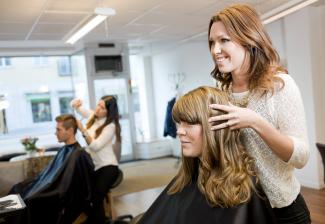
Look at these examples to see how reflexive pronouns are used.
She looked at herself in the mirror.
I'm trying to teach myself Italian with an app.
Our children walk to school by themselves.
Try this exercise to test your grammar.
- Grammar test 1
Read the explanation to learn more.
Grammar explanation
Reflexive pronouns are words like myself, yourself, himself, herself, itself, ourselves, yourselves and themselves. They refer back to a person or thing.
We often use reflexive pronouns when the subject and the object of a verb are the same.
I cut myself when I was making dinner last night.
I hope you enjoy yourselves at the party tonight!
My phone isn't working properly. It turns itself off for no reason.
We need to believe in ourselves more.
Adding emphasis
We can add a reflexive pronoun for emphasis when it's unusual or different.
He wants to pass his driving test so that he can drive himself to work.
She broke her arm, so she couldn't wash herself very easily.
We can use reflexive pronouns to emphasise that someone does it personally, not anybody else.
The door was definitely locked. I locked it myself.
Are you redecorating your flat yourselves?
We can also use a reflexive pronoun together with the noun it refers to in order to emphasise it.
We talked to the manager herself, and she agreed to give us our money back.
Parents themselves need to take more responsibility for their children's learning.
By + reflexive pronoun
We can use by + reflexive pronoun to mean alone.
He usually goes on holiday by himself.
Do you enjoy being by yourself?
Reciprocal pronouns
Notice the difference between plural reflexive pronouns and reciprocal pronouns (each other, one another).
They're buying themselves a new television.
They're buying each other small gifts.
We looked at ourselves in the mirror.
We looked at each other in surprise.
With reciprocal pronouns (e.g. each other), each person does the action to the other person/people but not to themselves.
Do this exercise to test your grammar again.
- Grammar test 2




Hello LearnEnglish Team,
What is difference between yourself and on your own?
I want to know differences between myself & on my own, himself & on his own etc.
Shetu Yogme.
Hello Shetu Yogme,
The meanings are very similar.
Do something on your own means individually without any help.
Do something yourself means that you (and not someone else) can achieve the goal.
For example, you can apply yourself could mean that you do not need to go to an office or another person to do it. You can apply on your own could mean that nobody's help is needed. The meanings overlap quite a lot.
Peter
The LearnEnglish Team
Good
Please let me know the reflexive pronoun for "everyone", thanks
Hi HeenaGV,
Good question. I'm afraid it's not a simple answer!
I would use "themselves", e.g. Everyone enjoyed themselves at the party.
I should point out that from a traditional point of view, it should be a singular pronoun, because "everyone" is also singular. This would lead to a sentence like this: Everyone enjoyed himself at the party. But there is no reason to assume (in this simple context, at least) that all the people at the party were male. Alternatively, we could say: Everyone enjoyed himself or herself. But some people may find this a bit over-long, or not very elegant.
I hope that helps.
Jonathan
LearnEnglish team
1. I woke ..... up last night because I kept coughing.
In English, the reflexive pronoun "myself" is used when the subject and the object of the verb are the same person. However, in this sentence, using "myself" is not necessary because the action of waking up is not reflexive; it doesn't involve an action being done to oneself intentionally.
Hi Ali_H_Ahmad001,
That's right that the action is not done intentionally. However, reflexive actions can be either unintentional (e.g. I cut myself when I was making dinner last night) or intentional.
You're right that "myself" is not necessary in this sentence, and we could simply say: I woke up last night because I kept coughing. However, it's also correct to say I woke myself up ... . In comparison, saying I woke myself up ... gives a stronger sense of the waking up being involuntary and caused by the coughing, because it has "myself" as an object, receiving the action (while I woke up ... does not have an object). It's a small difference but perhaps interesting to note!
Jonathan
LearnEnglish team
In high school English exam, I got a debate with teacher on my answer.
It is a writng test and the intended answer is this
: Preparing the ability to adapt yourself to new circumstances is crucial.
My answer is like
: Preparing the ability yourself to adapt to new circumstances is crucial.
Teacher says there is no 'you' as a subject so that 'yourself' cannot emphasize nothing. So it's not correct sentence.
But I cannot accept her explination. I know my sentence is quite awkward, but is it grammatically incorrect? It's vital for my score result. Please give your opinions.
Hello koreanenglish,
Exams are taken in the context of teaching and classwork that we are not familiar with. I'm afraid we don't get involved in discussions about them.
Best regards,
Kirk
LearnEnglish team
Hello i have a question, why do you use the reflexive pronoun "yourself" in a phrase like (The instructions on the box say "do it yourself")?.